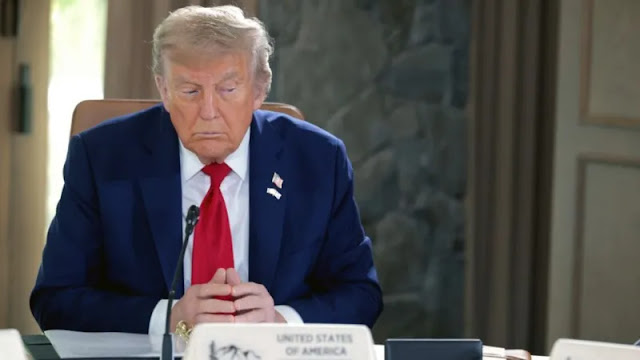On the Israel-Iran conflict, President Trump has veered from emphatically supporting Israel's strikes to strongly distancing himself from them and back again. His ambiguity has added to the sense of uncertainty as the fighting itself escalates - as has his departure from the G7 in Canada. He simply said he had "big stuff" to return to in Washington.
His departure was attributed to "what's going on in the Middle East," according to the White House, while later on Truth Social, he stated that it had "nothing to do with a Cease Fire." The attacks, according to Israeli Prime Minister Benjamin Netanyahu, were "fully coordinated" with the United States. So, what are Trump's influences and, more importantly, what are his options right now? Here, you can get live updates on the Israel-Iran conflict.
1. submitting to Netanyahu's demands and increasing As Israeli missiles hit Tehran on Thursday, Trump threatened Iran's leaders with "even more brutal" attacks from his Israeli ally armed with American bombs.
We are aware of Trump's ultimate goal. Similar to Netanyahu, he asserts that Iran cannot possess a nuclear weapon. Importantly, in contrast to Netanyahu, he has stated that a deal between the US and Iran is his preferred option. This route also reflects his self-described image as a world-class dealmaker. However, he has alternated between pushing diplomacy and resorting to forceful means of getting there. Last week he even said in the same breath that an Israeli attack on Iran would help a deal or it would "blow it".
Where is Israel's operation heading?
The so-called "madman" theory of foreign relations holds that his supporters sometimes paint his unpredictable behavior as strategic after the fact. This theory, which has previously been used to describe Trump's negotiating strategies, proposes that deliberately ambiguity or unpredictability regarding escalation works to compel adversaries—or even allies in Trump's case—to comply. It was famously attributed to some of the Cold War practices of President Richard Nixon.
Some of Trump's advisers and supporters back the "maximum pressure" side of the madman theory when it comes to his approach to Iran. Despite the fact that Iran signed an Obama-led nuclear deal in 2015 that Trump later withdrew from, they believe that the threats will prevail in the end because, according to them, the country is not serious about negotiating.
At the Tehran state broadcasting building, an explosion causes smoke to rise. Netanyahu has applied constant pressure on Trump to go down the military not diplomatic path, and the US president - despite his oft-stated desire to win the Nobel Peace Prize - may in the end see a need to deliver on his more belligerent threats to Tehran's leadership
Israel may also push harder behind the scenes for American involvement to, as it sees it, to finish the job. The US has bunker buster bombs Israel believes can destroy Iran's underground uranium enrichment site at Fordow.
As the fighting escalates, so does the pressure on Trump from the hawkish camp of Republicans in Congress who have long called for regime change in Iran.
Trump will also see the argument that it could force the Iranians into negotiating with him with a now weaker hand. But the fact remains that the Iranians already were at that table, as a sixth round of talks due with Trump's envoy Steve Witkoff had been planned in Oman on Sunday.








0 Comments